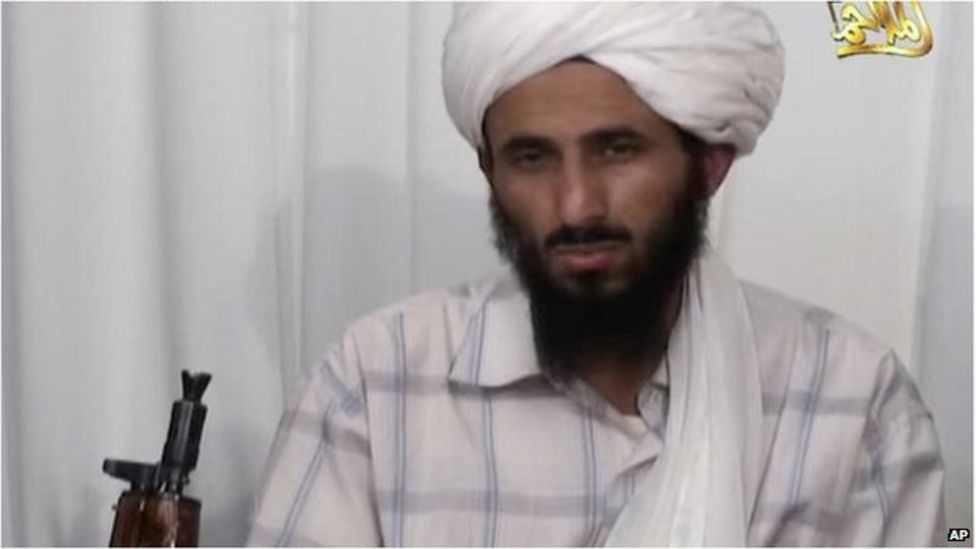Al-Qaeda has confirmed that Nasser al-Wuhayshi, the leader of its offshoot in the Arabian Peninsula, has been killed in a US drone strike in Yemen.
His death was announced by the AQAP group in an online video. His successor was named as military chief Qasim al-Raymi.
Wuhayshi was seen as al-Qaeda’s second-in-command and was a former personal assistant to Osama Bin Laden.
He built one of the most active al-Qaeda branches, say US officials.
Does killing militant leaders work?
In Yemen, resurgent al-Qaeda militants have seized territory and infrastructure – indirectly assisted by Saudi-led air strikes on the rebel Houthi movement, their Shia Muslim foes.
But the deaths of a number of leading figures in AQAP in recent months have reportedly fuelled rumours among supporters that it has been successfully targeted by intelligence agencies.
Analysis: Murad Batal al-Shishani, BBC Arabic
Nasser al-Wuhayshi was a major global figure among jihadists – even supporters of al-Qaeda’s rival Islamic State viewed Wuhayshi with respect.
According to reports, in August 2013 Wuhayshi was appointed deputy of al-Qaeda chief Ayman al-Zawahiri, a sign of the extent of his influence.
As well as creating AQAP itself, Wuhayshi also played a major role in forming the AQAP off-shoot, Ansar al-Sharia, in 2011, to appeal to disaffected youth in Yemen at the time of the Arab Spring.
AQAP’s leader cultivated good relations with local tribes, which helped his group advance in various places in the south of the country.
His death is no doubt a big blow for AQAP – but it seems to have been prepared for this moment, swiftly naming another highly influential figure, Qasim al-Raymi, to succeed him.
“We in al-Qaeda in the Arabian Peninsula mourn to our Muslim nation… that Abu Baseer Nasser bin Abdul Karim al-Wuhayshi, may God have mercy on his soul, passed away in an American strike which targeted him along with two of his mujahideen brothers,” Khaled Batarfi, a senior member of the group, said in the video.
The US confirmed his death on Tuesday. National Security Council spokesperson Ned Price said that Wuhayshi’s death had struck a “major blow” to al-Qaeda’s most dangerous affiliate.
He added that the killing had removed an “experienced terrorist leader” from the battlefield.
Wuhayshi is thought to be the highest ranking al-Qaeda leader killed since Bin Laden’s death in Pakistan in 2011.
Yemeni officials said Wuhayshi was believed to have been killed in a raid in al-Qaeda-held Mukalla, in south-eastern Yemen’s Hadramawt province.
Witnesses were quoted as saying an explosion had killed three men on the seafront last Friday – and that al-Qaeda gunmen had quickly cordoned off the area and gathered the remains, leading them to believe a leader was among those killed.
The US State Department had offered a $10m (£6.4m) reward, external for anyone who could help bring Wuhayshi – who is believed to have been in his 30s – to justice.
Wuhayshi, himself a Yemeni, travelled to Afghanistan in the late 1990s where he trained, fighting alongside and becoming a close confidant of Bin Laden.
As US forces closed in at the battle of Tora Bora in late 2001, he escaped into Iran.
There he was arrested and extradited to Yemen, where he was jailed until he escaped in 2006.
‘Greater and worse’
He became head of al-Qaeda in Yemen and then head of AQAP when the Yemeni and Saudi branches of al-Qaeda merged in 2009.
Al-Qaeda in the Arabian Peninsula (AQAP)
- Formed in January 2009 by a merger between al-Qaeda in Saudi Arabia and Yemen, and based in eastern Yemen
- Deputy leader – ex-Guantanamo inmate and Saudi national Said al-Shihri – killed in September 2012
- Following Nasser al-Wuhayshi’s death, Qasim al-Raymi now said to be new leader
- Aims to topple Saudi monarchy and Yemeni government, and establish an Islamic caliphate
- Came to prominence with Riyadh bombings in 2003, and 2008 attack on US embassy in Sanaa
- Says it was behind an attempt to blow up US passenger jet in December 2009
- Accused of being behind two foiled attempts to send parcel bombs to US on cargo planes in late 2010
- Claimed responsibility for massacre at French magazine Charlie Hebdo – some of the gunmen thought to have trained with AQAP
Since late January 2015, AQAP has lost a number of high-profile figures in US drone strikes – including religious official Harith al-Nadhari, ideologue and spokesman Ibrahim al-Rubaish, and religious and military official Nasser al-Ansi, along with lower ranking figures.
The proximity and precision of these assassinations has given rise to rumours in jihadist circles that AQAP has been infiltrated by spies, BBC Monitoring reports.
The US use of drones – in Yemen and elsewhere – has long been a source of controversy.
Last week the families of two Yemeni citizens killed in a US drone strike launched a lawsuit in Washington DC, demanding that the US admit the strike was unlawful.
